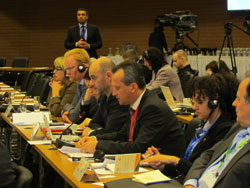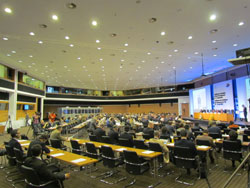Tuesday, 23 April 2013, Cyprus
Address of the H.E. Trajko Veljanoski at the Conference of Speakers of EU Member States and Candidate Countries “Social cohesion in times of austerity – what can national parliaments do”
 Distinguished,
Distinguished,
Since the beginning of the 20th century the humanity is being faced with unseen demographic changes. This majorly is a result of the decrease of the birthrate, the live span and the migration flows. In Europe, this phenomenon has got its name “the aging societies”. The statistics show concerning numbers. The situation of the population shall not change significantly in 2060, but the older population, over 65 of age will be predominant.
The European crisis shook the world, including the European continent. The crisis imposed taking responsible measures by the European politicians and greater solidarity among the citizens finding a solution for sustainable development and growth, competitiveness and cohesion on global scale. The problem with the unemployment, that was present before the financial crisis with unequal distribution in the Member States, was significantly worsen in the states which were more influenced, but did not miss those that were the example for the Union. Even more concerning is that the unemployment still grows and influences the most the youth under 30 years of age, many young people leave education early and have hard times finding a job due to incompatible qualifications. The tough economic situation forces some of them to leave the state, and seek for employment somewhere else.
The consequences of the economic crisis reflected on the economies of all Member States of the Union, and on the Candidate States, which once again proves that the crisis does not recognize borders, ethnicities, nations, races, religion, gender or belonging. The adoption of the Lisbon Treaty is a good basis for social cohesion, projecting sustainable development based on balanced economic growth and stability of the prices, competitiveness of the social and market economy, employment and social progress, as well as fight against the social exclusion. The five key priorities of the Europe Strategy 2020 are challenging for all Member States, but also for those which aspire to be members of the Union.
The Republic of Macedonia took series of measures and activities for mitigation of the consequences of the economic crisis. The Government took activities for employment of the young people through various programs for self-employment, grants, credits and subventions. Taking the reforms in the economic, education and employment policies, the Government tends to systematically establish long-term mechanisms for handling the unemployment, increase the possibility of young people, long time unemployed persons, and especially unemployed women to find a job or/and to gain skills and knowledge.
In order to increase the entrepreneurship spirit, especially among the young people, series of activities motivating own businesses through grants were taken. This immediately contributed in the creation of new working positions for the young people in particular. Needed regulation for minimal salary was adopted, and significant steps were taken for subsidizing the employment, financial support and development of skills for vulnerable, marginalized groups and people with special needs. The situation imposes continuation of the budget support for adult education, as well as training for the professions which are needed on the market. Significant part of these reforms was realized with the support of the European Union, in the framework of the Instrument for Pre-accession Assistance.
The problem with the decreased birthrate and aging society is a problem in the Republic of Macedonia as well. The increased dynamics of life, unemployment, poorness contribute for the small number of families with many children, and fewer marriages. The Government of the Republic of Macedonia initiated a capital project for lifelong support of women who will decide to have third child, aiming to facilitate the situation of the women in the society and in the family.
 Regarding the improvement of the business climate and attracting foreign investments, the Republic of Macedonia made through reforms, as a result of which Doing business positioned the state at the 6th position according to the criteria for opening a business, proclaiming it as a leader in the region. The most recent mission of IMF evaluated the Republic of Macedonia as a country with stabile economy and macroeconomic performances, beside the hard economic surroundings, projecting a possible growth of 2% by the end of this year, which should be recognized, especially for a Candidate state- since not all Member States of the Union have such projections.
Regarding the improvement of the business climate and attracting foreign investments, the Republic of Macedonia made through reforms, as a result of which Doing business positioned the state at the 6th position according to the criteria for opening a business, proclaiming it as a leader in the region. The most recent mission of IMF evaluated the Republic of Macedonia as a country with stabile economy and macroeconomic performances, beside the hard economic surroundings, projecting a possible growth of 2% by the end of this year, which should be recognized, especially for a Candidate state- since not all Member States of the Union have such projections.
Where are the Parliaments and what are is their role in the area? The Assembly of the Republic of Macedonia has done a lot in this context, organizing public debates in the Committee on Equal Opportunities for Women and Men and the National European Integration Council, where the MPs hear the opinion of the civil society and the experts from the area, and take it into account before the final adoption of the legislation.
The skill of a society is to ensure welfare for all citizens, to minimize the differences and to avoid marginalization, providing social cohesion. The Politics is the art of the possible. Our task is to make the possible reality of our citizens.
Thank you.